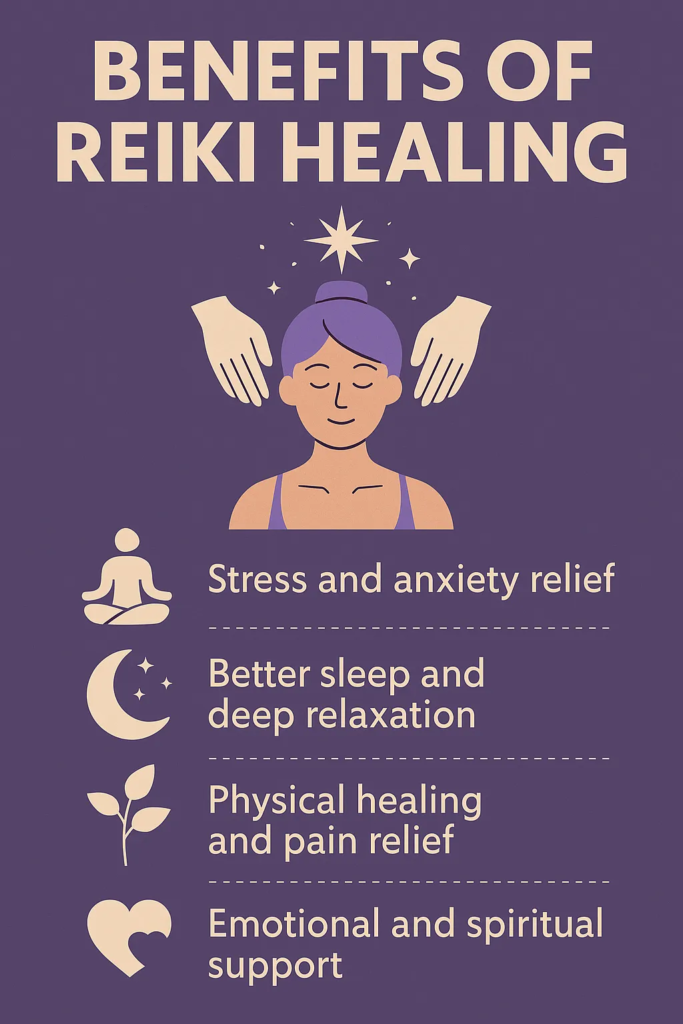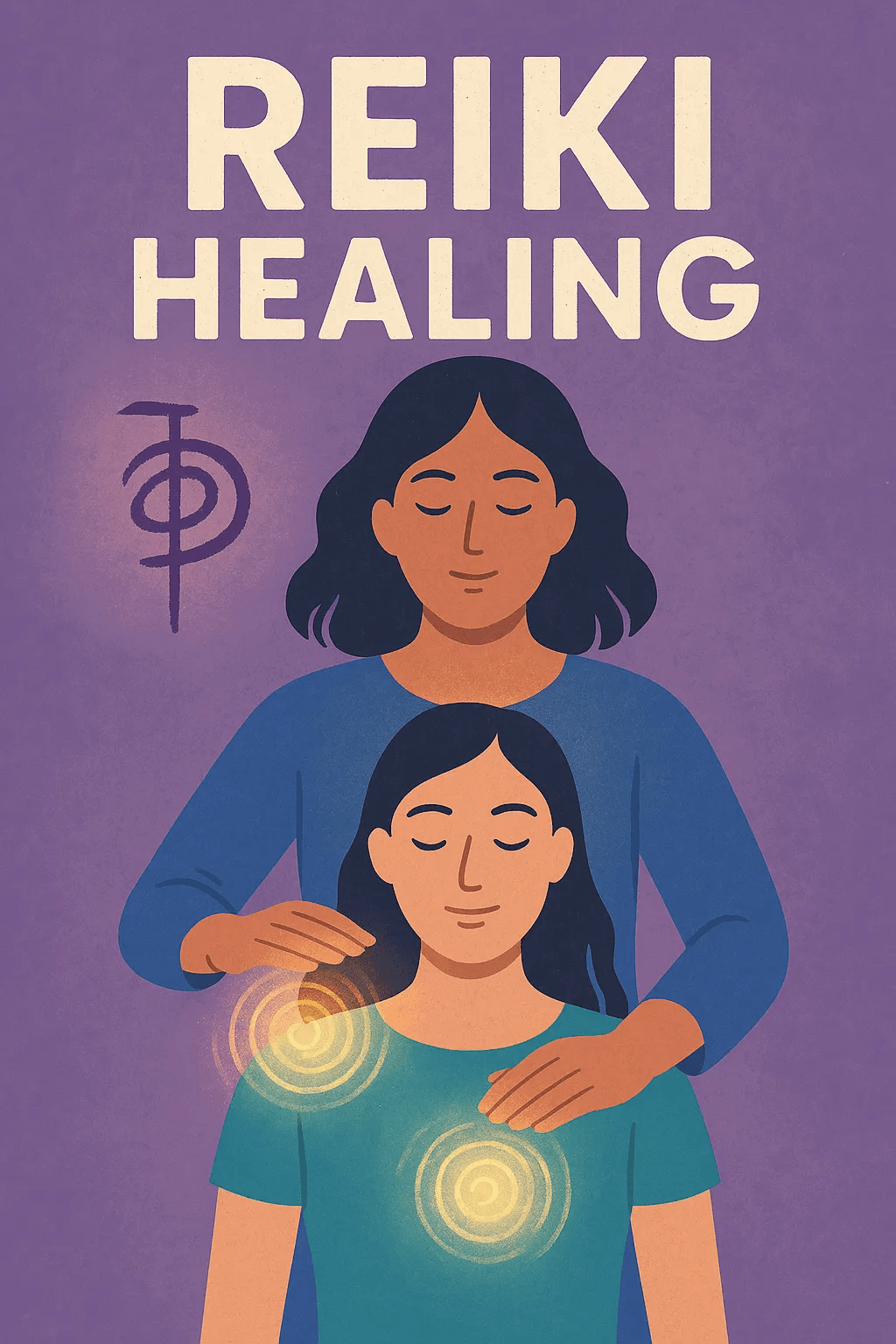Caution: Reiki is considered a complementary therapy and should not replace conventional medical treatments.
Reiki healing — is a gentle, hands-on (or sometimes hands-off) energy therapy that channels universal life force to support your mind, body, and spirit.
In a fast-paced world brimming with digital overload, rising stress levels, and a growing disconnection from our own inner rhythms, more and more people are seeking out natural healing methods to restore balance, peace, and energy.
If you’ve ever searched for terms like “reiki near me,” “reiki therapy,” or wondered about the benefits of a “reiki healing session,” you’re not alone, interest in this ancient modality is surging — and for good reason. 💫
Whether you’re completely new to the practice or considering booking your first session, this in-depth guide will explain exactly what Reiki healing is, what you can expect from a session, and how it might support your emotional, physical, and spiritual wellbeing.
✋ What Is Reiki?
Reiki (pronounced ray-key) is a Japanese energy healing technique that promotes relaxation, reduces stress, and encourages healing by activating the body’s natural energy flow. The word itself combines “Rei,” meaning “universal,” and “Ki,” meaning “life force energy.” This life force energy flows through every living being — and when it’s low or blocked, we’re more likely to feel stressed, get sick, or feel emotionally unbalanced.
Reiki healing works to clear these energy blockages, helping the body return to a natural state of harmony and equilibrium. 🌱
Originally developed by Dr. Mikao Usui in the early 20th century, Reiki has since spread across the globe and is now practiced by millions of people in wellness centers, private practices, spas, and even hospitals.
💆♀️ What Happens During a Reiki Healing Session?
For many, the idea of energy healing can seem mysterious. But a Reiki session is actually one of the most calming, peaceful experiences you can have.
Here’s what typically happens:
🧘 Setting the Scene
When you arrive, you’ll be welcomed into a quiet, soothing environment — often with soft music, dim lighting, and a gentle aroma of essential oils. You’ll lie fully clothed on a massage table or seated comfortably in a chair, depending on your mobility and preference.
✋ The Reiki Practitioner’s Role
Your Reiki therapist or Reiki master (depending on their training level) will either lightly lay their hands on or just above different parts of your body. These hand positions correspond to your energy centers — often referred to as chakras.
The practitioner serves as a channel for Reiki energy, allowing it to flow into your body to support emotional healing, physical balance, and energetic alignment.
🌌 Sensations and Energy Shifts
Clients commonly report feeling:
- Warmth or coolness
- Gentle tingling
- A sense of floating
- Emotional releases (tears, laughter, or deep calm)
- Deep relaxation or meditative states
Each session is unique. Even seasoned clients say no two treatments are ever the same.
🌀 Benefits of Reiki Healing

So, why are so many people turning to Reiki healing therapy?
Here are some of the most frequently reported benefits:
🧘♂️ Stress and Anxiety Relief
Reiki has a profound effect on the nervous system, helping to switch the body from fight-or-flight into rest-and-digest mode. People often describe feeling mentally lighter and emotionally clearer after just one session.
💤 Better Sleep and Deep Relaxation
Clients often report sleeping better and feeling more rejuvenated after Reiki. It’s a beautiful, non-invasive way to unwind and restore your natural sleep rhythms.
🌿 Physical Healing and Pain Relief
While Reiki is not a replacement for medical treatment, many use it alongside conventional therapies to help with:
- Chronic pain
- Headaches
- Injury recovery
- Digestive disorders
- Autoimmune conditions
Some hospitals even offer Reiki for cancer patients as part of integrative care to ease nausea, fatigue, and emotional distress during treatment.
❤️ Emotional and Spiritual Support
If you’re processing grief, loss, trauma, or emotional overwhelm, Reiki healing can help gently release these stored emotions and promote inner peace. Many describe it as a spiritual experience that reconnects them with their intuition and soul path.
🌍 Different Types of Reiki
While the original Usui Reiki system remains the foundation of most practices, there are several variations of energy healing that have evolved over time:
🔮 Usui Reiki
The most common and traditional form, focusing on hands-on healing and spiritual principles.
✨ Karuna Reiki
Often used by advanced practitioners, Karuna focuses on compassionate healing and working with deeper emotional wounds.
🔆 Distance Reiki Healing
Yes, Reiki can be sent across space and time! Many practitioners offer distance Reiki sessions that are just as powerful, especially for clients who can’t attend in person.
🔎 What to Expect After a Reiki Session
It’s common to feel deeply relaxed, lighter, or more “in tune” with yourself after a Reiki treatment. Some people report immediate energy shifts, while others notice subtle changes over the following days.
You might experience:
- Increased emotional awareness
- Vivid dreams or insights
- Temporary detox symptoms (like fatigue or mood swings)
- A feeling of peace and clarity
It’s always advisable to drink plenty of water, rest, and be gentle with yourself post-session. The effects can continue unfolding for days.
🙋♀️ Frequently Asked Questions About Reiki Healing
❓ Is Reiki safe?
Absolutely. Reiki is completely non-invasive and complementary to all medical treatments. It’s suitable for all ages — from babies to the elderly.
❓ Do I need to believe in it for it to work?
Not at all. While being open can enhance your experience, Reiki works regardless of belief, because it’s based on universal life energy — not suggestion or placebo.
❓ How often should I get Reiki?
That depends on your needs. Some clients come weekly, others monthly, and some just as needed. Your practitioner can guide you based on your wellness goals.
🔍 How to Find a Reiki Healer Near You
If you’re searching for “Reiki healing near me”, you’ll find thousands of practitioners offering sessions both in person and online. Here’s how to choose the right one:
- ✅ Look for certified practitioners (usually Level II or Reiki Master)
- ✅ Read reviews and testimonials
- ✅ Ask if they specialize in areas that matter to you (like trauma, chronic pain, spiritual growth)
Many mind, body, and spirit events also host Reiki healers offering taster sessions — a great way to try Reiki in a welcoming, heart-centered setting.
💜 Reiki and Holistic Wellness
Reiki therapy fits beautifully into a holistic lifestyle that prioritizes natural healing and personal growth. Many people combine Reiki with:
- Meditation 🧘♀️
- Sound healing 🎵
- Crystal therapy 🔮
- Yoga 🧘♂️
- Chakra balancing ⚖️
- Aromatherapy 🌸
This integrative approach helps you heal not just the symptoms, but the root causes of imbalance — aligning your energy on all levels: mental, emotional, physical, and spiritual.
🎟️ Experience Reiki at a Mind, Body & Spirit Event Near You
Want to try Reiki in a community setting filled with healing, connection, and inspiration?
Explore our upcoming Reiki events, workshops, and retreats where you can:
🌟 Meet certified Reiki practitioners
🌟 Receive on-the-spot healing sessions
🌟 Learn about Reiki attunement and how to become a practitioner yourself
🌟 Enjoy talks, demos, and spiritual experiences in beautiful sacred spaces
Whether you’re a seasoned spiritual seeker or just beginning your journey, these events offer a safe and uplifting environment to discover the transformative power of Reiki.
✨ Final Thoughts
In a world where stress and burnout are at all-time highs, Reiki healing offers a gentle, nourishing, and profoundly effective way to reconnect with your inner peace and unlock your body’s natural ability to heal.
Whether you’re drawn to Reiki for emotional clarity, physical pain relief, spiritual alignment, or simply a deeper sense of calm — it might be just the healing tool you’ve been looking for.
So why wait?
Book a Reiki session, explore an event, or dive deeper into the world of energy healing today. 💖
Further reading:
1. Definition and Origins of Reiki:
- Reiki as a Japanese healing art: Reiki is a Japanese healing art developed by Mikao Usui in the early 20th century. Cancer Research UK+1Health+1
2. Benefits of Reiki Healing:
- Relaxation and stress reduction: Reiki aims to relax you, ease stress and tension, and help with well-being. Cancer Research UK
- Reduction of anxiety and depression: Studies suggest that Reiki can reduce anxiety and depression, and improve self-esteem and quality of life. PMC
- Pain management: Reiki has been found to significantly reduce pain and the need for analgesics following procedures like total knee arthroscopy and Caesarean section. PMC+1PMC+1
3. Reiki in Clinical Settings:
- Use in palliative care: Reiki is sometimes used in palliative care, especially in hospices, to help patients feel more relaxed and cope with difficult situations. Cancer Research UK
- Integration into NHS services: Some NHS trusts offer Reiki as a complementary therapy to aid relaxation, not as an alternative to conventional treatments. PMC+2Doc Library+2Cancer Research UK+2
4. Considerations and Limitations:
- Complementary nature of Reiki: Reiki is considered a complementary therapy and should not replace conventional medical treatments. Cancer Research UK



